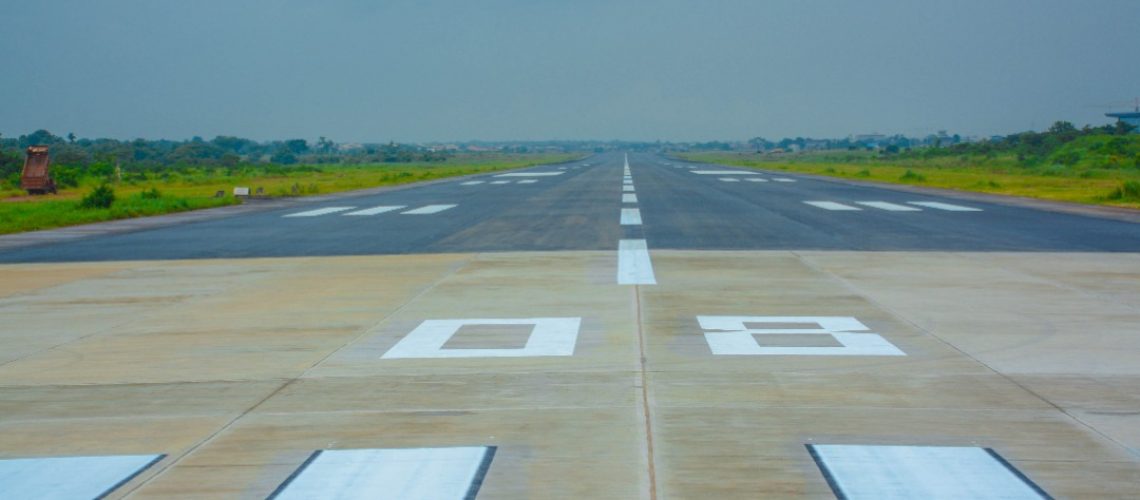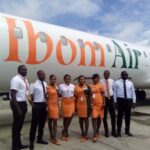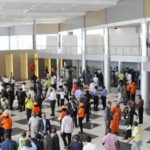
Due to infrastructural, environmental and managerial factors, Nigerian airlines underutilise their aircraft, which has negative impact on their profitability.
Pilots and engineers agree that a Boeing B737 can be operated about 16 hours a day.
In Nigeria, most aircraft on scheduled commercial service barely operate for 11 hours when ground turn around is considered. This is because most airports are daylight airports so airlines cannot operate to those airports after 6:30 pm.
There could be infrastructural hiccups at airports, which cause delays, especially on busy airports such as Lagos and Abuja airports. Other factors could include delays in the supply of aviation fuel and also bad scheduling by airlines.
Industry expert and data analyst who is also flight dispatcher, Shadrach-Swante Kambai, explained recently in an article that there is generally gross underutilisation of aircraft capacity, which has great negative implication on the profitability of airlines in Nigeria.
He stated that the number of seats occupied in a commercial flight is directly related to the profitability of that flight.
“With the addition of four new airlines, competition for passengers is inevitable therefore the need for airlines to ensure effective utilisation of their capacity cannot be over emphasis because the unusual increase in demand for seats in December will meet adequate supply but what will now happen in January when demand will drop sharply while operating cost remain the same?” he asked.
Movement and Passenger’s Volume
Kambai observed that Nigerian airlines record more aircraft movement in January but with less volume of passengers.
He explained, “For the purpose of this article I am making the following assumptions. Average operating cost of $5352 per block hour (Source: 2018 Form 41, Schedules P-5.1, P-5.2 and T-100). Every flight is equal to 1 block hour. Every flight has 100 seating capacity 20 per cent of total flights are private executive jets. Now in December 16,448 flights moved 988,619 passengers while in January 18,787 flights moved 852,444 volume of passengers, this means there was excess 2339 flights which is equal to 15 per cent increase of aircraft movements in January but with 136175 less passengers than December.
“In view of the above assumptions, we will have 1872 excess domestic flights in January at a total value of (1872 * $5352 = $10,018,944 USD) operating cost, and this implies $10,018,944 USD of gains made in December was lost in January operating 1872 flights that added no profit to the airlines

“Also looking at the average seat occupied per aircraft based on the above figures, there is an average of 60 passengers per flight in December and 45 passengers per flight in January, this reveal that there is about 40 per cent underutilisation of aircraft capacity in December and 55 per cent in January which means the aviation industry lost 15 per cent seating capacity in January but operated 2339 more flights than in December,” he said.
Proactive Measures
Kambai therefore recommended proactive operational intelligence measures by airlines such as increasing their number of flights by 15 per cent in December to take advantage of the unutilised seat capacity while maintaining average price of tickets and reducing their number of flights by 15 per cent in January to avoid incurring losses due operating cost without reciprocal increase in passengers; instead of crashing down ticket price to a ridiculous amount.
He also recommended effective collaboration and interlining by airlines, noting that to sells services to customers that are provided by another airline would help airlines reduce cost by merging passengers in one flight instead operating two flights with 45 seats occupied each.
He said one flight could accommodate 90 passengers at once like the partnership signed recently between Dana Airlines Limited and Ibomair.
Kambai recommended aircraft type’s variation and leasing, remarking that these would help significantly, explaining that an airline operating smaller planes could lease bigger planes to use only in the peak period like in this case from late November to December.
“Now as an Aviation Business Developer, I will advise Chief Executive Officers (CEOs) and Chief Operating Officers (COOs) of airlines in Nigeria that instead of crashing the price of tickets in January, I will rather increase my frequency by 15 per cent in December at an average market price because I will reduce operational cost in January by reducing frequency seeing that increasing flights in January does not translate to increase in profit. Even though this data is for 2015 alone, the pattern will still remain the same or even get worse with the coming of four additional airlines in the industry,” he stated.
Operational Time
The Managing Director of the Nigerian Airspace Management Agency (NAMA), Captain Fola Akinkuotu, told THISDAY in a telephone interview that there is limited operational time in Nigeria compared to other parts of the world where aircraft could be utilized for a longer period of time.
He said that security and societal values play roles in why flights do not operate late in the night in Nigeria, noting that it would be difficult in cities like Abuja and Lagos where there is relative security for travellers to go to the airport by mid night and travel to another destination by 2:00 am. This could be done in other countries but it would be difficult to do so in Nigeria.
He noted that it is true that lack of airfield lighting in some airports could be a limiting factor but stressed that it is the people’s disposition not to travel late in the night that is why most domestic flights end in the early hours of the night.
“The major challenge is not airfield lighting. Many people don’t want to travel late. I agree that Nigerian airlines do not fully utilise their aircraft, but operational hours is dictated more by the situation of the society. Aircraft should fly for longer hours because they make money when they fly.
“I agree that Abuja and Lagos are relatively safe, but many people will not leave their house by 2:00 am. Another factor you have to take cognizance of is that many people who are coming to Abuja are coming to do business. If they arrive that early, where will they stay until the offices where they want to go are opened?” Akinkuotu asked.
He recalled that in the past in order to fully utilise the aircraft, Nigerian airlines operate to destinations in the West Coast like Dakar, Senegal in the night after operating domestic routes during the day. “We used to go to operate to West Coast in the night. We fly to Dakar because the city was a cross over point to South Africa,” he said.
Night Flights

THISDAY learnt that some of the airports that have airfield lighting like Enugu and Calabar do not operate into the night; except when requests are made by airlines and then they would have to pay some money so that the staff of the Federal Airports Authority of Nigeria (FAAN) and that of NAMA would wait for the airline’s flight to land and take off.
Captain Akinkuotu explained that the major reasons are that many of the airports use generators as source of electricity and there is inadequate manpower. So it is due to the high cost of operating the airports that they close by 6:30 pm or thereabout, but Akinkuotu noted that if the airlines come together and decide that they would maintain traffic on those routes late in the night, it could be arranged and the airports would adjust their operating schedule.
“A lot of these airports are run by generators. It would be a huge loss of resources if you keep operating them when there is no traffic and airlines are not coming in. So we have power and manpower issues. But if there is justified demand adjustments can be made to accommodate that demand. The airline operators, NAMA and FAAN can meet and agree that flight time can be extended to the airports. This will have to involve all the airlines; not for one airline; so if there is a guarantee for traffic in those late hours for the airlines, the agencies can bring in the needed manpower,” he said.
Loss of Profit
The Chief Operating Officer of Dana Air, Obi Mbanuzuo, told THISDAY that the major factor that leads to the underutilisation of aircraft is environmental. He noted that there are airports that have airfield lighting but airlines cannot fly late in the night. He remarked that it might not be safe to fly to Port Harcourt by 11 pm in the night because it might not be safe for the passengers.
But he also observed that many of the airports do not have airfield lighting. For example, flights can land late in the night in Owerri but the airport does not have airfield lighting. Enugu has airfield lighting but the airport is shut by 6:30 pm because of paucity of manpower and the fact the airport largely runs on generator.
“We require airfield lighting in almost all the airports. In some of the airports if we have good weather and Visual Flight Rule (VFR), we can land by 10:00 pm. But the question that comes is, if there is slightly bad weather, do we have the landing aid? It is worthy to note that by 6:30 pm our aircraft have started returning to park. The one from Enugu returns by about that time. It is only Abuja you can deploy aircraft that late. We cannot operate to Port Harcourt after 7:00 pm due to security concerns,” he said.
Mbanuzuo also agreed with the NAMA Managing Director that airport cannot be kept open, wasting fuel on electricity generator when there is no traffic and suggested that airports and airlines should meet and agree on how to maximise operational time. He said that airlines have to request for time extension to many airports in the country before they are open for landing, noting that the airports in Asaba and Uyo, which are owned and operated by Delta and Akwa Ibom state governments respectively have airfield lighting.
“I agree with Captain Akinkuotu about manpower issues and the fact that some of these airports are powered by generators. But the management of the airports and airlines can meet. Airports meet airlines to canvass for business. Whenever we want to fly later than 6:30 pm to some of these airports we seek approval and pay about N150, 000 to N200, 000 to FAAN,” Mbanuzuo added.
THISDAY also learnt that obsolete infrastructure also add to the underutilization of aircraft because of the delays caused by passenger processing, as the airports, especially the busy ones in Lagos and Abuja have limited scanning machines and spends average of three minutes to process each passenger. Also the boarding gate at the General Aviation Terminal and that of Abuja domestic wing cannot enable the boarding of many flights at the same time; otherwise it would become crowded.






